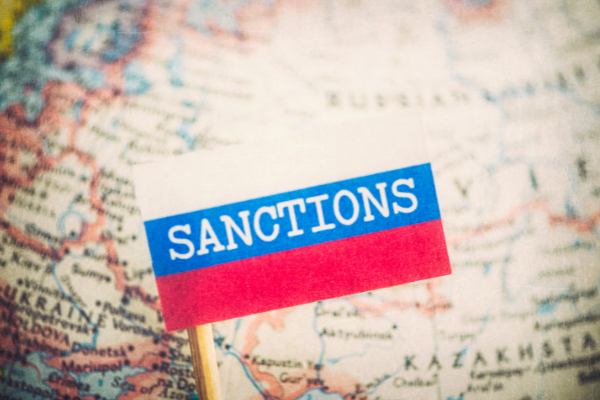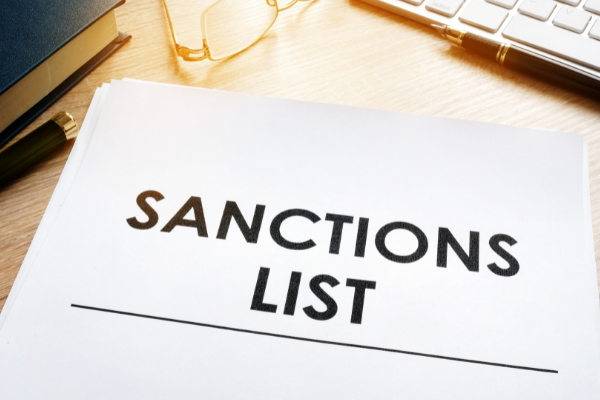BY:
SHARE:

Following Russia’s invasion of Ukraine, the UK’s commitment to global security through intensified sanctions has taken centre stage. Among the UK’s key priorities is the non-proliferation (the unintentional spreading) of weapons of mass destruction (WMD) and other controlled goods.
This focus reflects the UK’s adherence to international agreements and aligns with its national interest in maintaining peace and security. The sanctions landscape has placed two governmental departments under the spotlight: the Office of Financial Sanctions Implementation (OFSI) and the Office for the Strategic Implementation of Export Controls (OTSI). These departments have had pivotal roles in enforcing compliance and deterring violations alongside HMRC and the Export Control Joint Unit (ECJU) of the Department for Business and Trade (DBT).
The UK government has utilised sanctions as a key mechanism to prevent the proliferation of WMD (Weapons of Mass Destruction) and related materials. The sanctions aim to disrupt supply chains, restrict access to critical technologies, and isolate proliferators from the international financial system by targeting individuals, entities, and sectors tied to Russia's military-industrial complex.
In this context, non-proliferation refers not only to preventing the spread of nuclear weapons but also to controlling dual-use goods and technologies that could contribute to WMD development. This includes:
- advanced electronics
- software
- engineering equipment
All the above are closely monitored under UK export control laws.
The Office of Financial Sanctions Implementation (OFSI) is part of HM Treasury. It is responsible for implementing and enforcing financial sanctions in the UK. These sanctions can freeze the assets of designated individuals and entities and prohibit UK persons or businesses from engaging in transactions with them. By enforcing financial restrictions, OFSI ensures that those involved in proliferation activities are denied access to resources and capital, cutting them off from potential investment and funding.
The Office for the Strategic Implementation of Export Controls (OTSI) operates under the Department for Business and Trade, overseeing the regulation of controlled goods and technologies. It ensures that UK exporters comply with export controls by requiring licences for exporting, transferring, or brokering goods and services that could contribute to proliferation activities. OTSI works closely with businesses to raise awareness of their obligations and provides guidance on compliance.
To underscore its commitment to non-proliferation, the UK has increasingly relied on enforcement actions against companies that fail to comply with sanctions and export control laws. Notable cases from 2023 and 2024 illustrate the government’s resolve to hold violators accountable. In August 2023, a UK company was fined £1 million by HM Revenue & Customs (HMRC) for unlicensed trade of goods in violation of The Russian (Sanctions) (EU Exit) Regulations 2019. This penalty underscores the critical importance of robust due diligence and compliance measures for businesses engaged in international trade.
NTE 2023/17: A Compound Settlement
In April 2024, HMRC gave details of a compound settlement with an unnamed UK company that had agreed to pay £258,000 concerning the “unlicensed transfer of dual-use goods controlled by Retained Regulation 428/2009”. A similar compound settlement was reached in June 2024, and the unnamed company agreed to pay £90,853.20 in relation to the “unlicensed exports of military goods controlled by “The Export Control Order 2008”. On 27 September 2024, OFSI imposed a £15,000 civil monetary penalty on Integral Concierge Services Limited (ICSL), a UK-based property management firm. The company provided services to a designated individual subject to an asset freeze without obtaining the required OFSI license, despite being aware of the individual’s sanctioned status.
On 18 November 2024, EDM Limited was sentenced for breaches relating to the UK Export controls. EDM Limited was offered a compound settlement by HM Revenue and Customs (HMRC), which they did not accept within the time allowed.
They were found guilty on three counts of exporting military goods without the necessary licence and fined £89,359.80 (including costs). The value of the goods concerned was £38,967.68. The maximum penalty available to the court in this case was approximately £116,000.00 (3 x the value of the goods).
This matter concerned the evasion of UK export licencing controls on three exports of goods related to a military flight simulator. These goods required an export licence under the Export Control Order 2008. Unauthorised exports contradict section 68(1) of the Customs and Excise Management Act 1979.
NTE 2024/30: Sentenced for Breaches of UK Export Controls
These penalties highlight the UK’s determination to close loopholes in the system and signal that intentional or due to negligence violations will not be tolerated.
While the UK government has stepped up its enforcement efforts, businesses face several challenges when navigating the complex landscape of sanctions and export controls.
Key difficulties include:
Evolving Regulations: The sanctions regime is dynamic, with frequent updates to designated entities and goods lists.
Supply Chain Transparency: Ensuring compliance across complex, global supply chains requires significant resources and expertise.
Risk of Diversion: Goods exported to non-sanctioned countries may still be at risk of diversion to sanctioned entities.
To mitigate these risks, businesses are encouraged to adopt robust compliance programs, including regular training, end-user verification, and close transaction monitoring.
Looking ahead, the UK intends to refine its sanctions and export controls further. Close cooperation with international allies is essential to ensure a coordinated effort to prevent proliferation. Government agencies will play a crucial role in this ongoing endeavour by enforcing penalties and actively engaging with businesses to promote compliance.
Recent fines and enforcement actions underscore the importance of remaining vigilant in an increasingly regulated global environment. The UK’s commitment to non-proliferation, particularly in the context of Russian sanctions, highlights its dedication to international security. By empowering government agencies to enforce these measures, the government clearly communicates that compliance is imperative and that those who violate these rules will face serious consequences. For businesses, being proactive about regulatory requirements is not just a legal obligation but also a vital aspect of their corporate responsibility.
OneCall™ Email assistance as and when required; A one-call solution for all your import, export and customs enquiries. Export help. Import help. Customs help.
Stay informed about customs and international trade matters by subscribing to our OneCall™ service. This comprehensive offering includes a dedicated email helpline for support, timely practical updates direct to your inbox (Did You Know?), monthly UK Customs & Trade Briefings and access to an interactive members' area with an exclusive community for our subscribers.
International Trade Updates & Spotlight Newsletter
Subscribe to our free information emails covering international trade topics...











